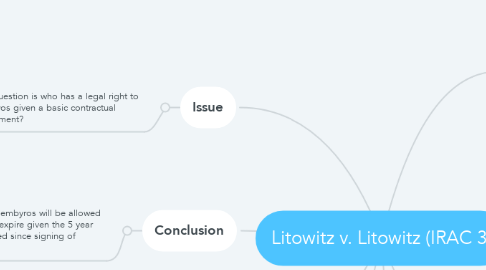Litowitz v. Litowitz (IRAC 3)
by James Hinton


1. Issue
1.1. The question is who has a legal right to embryos given a basic contractual agreement?
2. Conclusion
2.1. Per contract, the embyros will be allowed to thaw out and expire given the 5 year period has passed since signing of contract
3. Analysis/Application
3.1. Each side presented the case as a right to their genetic material or potential "children.
3.1.1. Court then found the case a matter of basic contract law and not related to personal views of what may constitute children or potential life.
3.1.1.1. Court applied the 5 year stipulation of the contract to influence the decision.
3.1.1.1.1. The court narrowed the law to represent a case of honoring the language of a 5 year contract which would allow the embryos to simply expire upon completion of 5 years past signing.
4. Importance
4.1. The case is extremely important considering potential religious or political views relating to "right to life" or right to one's own genetic material.
4.2. Basic contract law was still utilized to maintain an agreement between two parties with stipulations. The physical elements were not considered of immediate interest to the court.
5. Facts
5.1. Married couple separate and have dispute over embryos
5.2. Five pre-embryos were created from the combination of donor eggs and Mr. Litowitz’ sperm.
5.3. Mr. Litowitz asked the court to allow him to put the two frozen embryos up for adoption; Mrs. Litowitz asked the court to allow her to use another surrogate mother to have them as her own children.
6. Rule of Law
6.1. Basic contract law applied to case
6.2. Contract states that any disagreement leading two nonconsenting parties will be brought before a court
6.2.1. Embryos allowed to expire per contract regardless of views or position of parties
7. Impact
7.1. In re Marriage of Witten, 672 N.W.2d 768 (Iowa 2003) The case involves parties and their inability to reach an agreement. Contract law takes place and the prior written agreement does not allow the frozen embryos to be used. Roman v. Roman, 193 S.W.3d 40 (Tex.App.-Hous. (1 Dist) 2006) Contract law makes discarding embryos enforceable given divorce. Case involved another couple that signed an agreement prior to being divorced. Any embryos could then be discarded in the case of a divorce.
7.1.1. Future cases upheld the rule of basic contract law and do not incorporate other philosophy into court decision.

